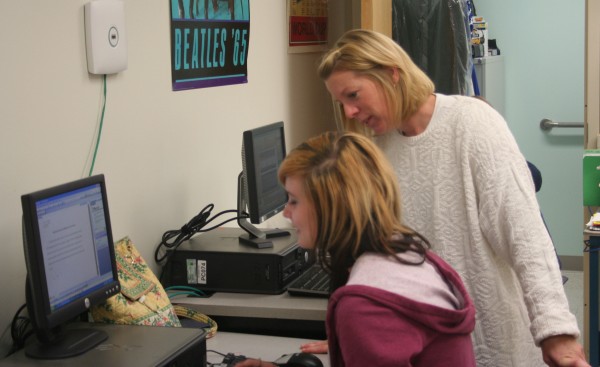With a name like the Individualized Academic Center (IAC), students may think the IAC only provides assistance with school work.
However, that assumption is incorrect.
Shawn McAteer, IAC teacher, is in charge of the IAC and helps students with more than just their academics.
“It is a choice program for students who need extra support to get through high school, and who have a track record of failing classes,” said McAteer. “The IAC offers academic, behavioral, and emotional support for students.”
Since 1998, 134 out of 268 students enrolled in the IAC have graduated.
“[In the IAC] I provide one-on-one instruction. I am an advocate for the student and hook them up with the other intervention services they may need,” McAteer said.
Chelsea McClellan, junior, has been in the IAC since freshman year.
“I come here for academic assistance because I had transferred from St. Louis Public Schools in 8th grade and I was quiet and laid back and didn’t know anyone,” McClellan said.
“But once I was in the IAC my work ethic got better, I got more outspoken and things got better from there.”
The IAC program has helped many students improve their grades and their overall high school experience. As of May 2010, the average GPA improvement for the students in IAC was .155, and 50 percent of all students overall increased their GPA.
Out of the 268 total students who have enrolled in IAC, 91 percent have stayed in school, and 100 percent of seniors in IAC have graduated from high school, according to statistics compiled by McAteer.
Grace Alexander, senior, has been in the IAC for four years.
“I went to the IAC because my grades were really bad,” Alexander said. “Mrs. McAteer has taught me study skills, how to be productive with my time and how to manage my ADHD.”
Alexander said she likes that the IAC provides a place for kids to get individual help when they need it.
“It’s nice to have someone who understands the problems they are facing, whether ADHD or really bad grades,” Alexander said.
McAteer is the only teacher in the IAC and provides the students with all the assistance they may need.
“Some [students] just need basic academic help,” McAteer said. “But I have to identify what behaviors stopped them from being successful. We work on a lot of goal setting and planning.”
As of fall of 2009, the statistics of IAC prove that if the struggling student is kept in the IAC 95.5 percent will graduate, according to McAteer’s records. This graduation rate matches the overall graduation rate of MHS and is better than Missouri’s graduation rate of 85 percent and the nation’s graduation rate of 70 percent.
“The IAC meets the needs of the students who are there at the time,” McAteer said. “It becomes whatever they need.”



